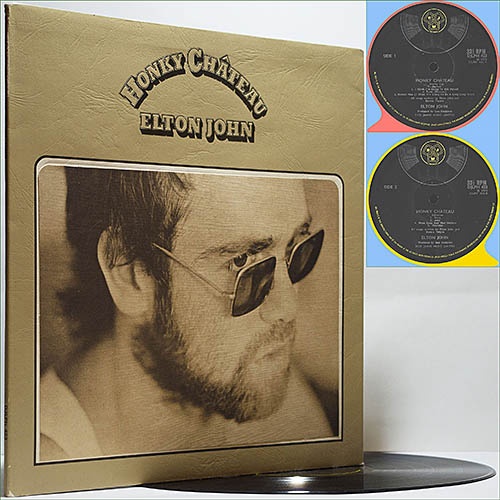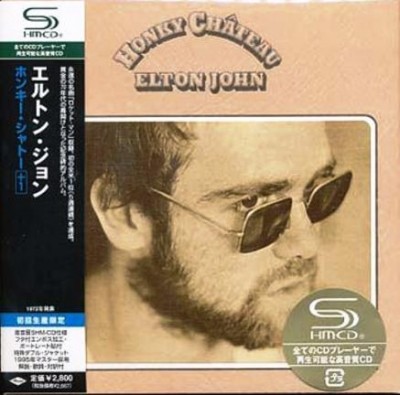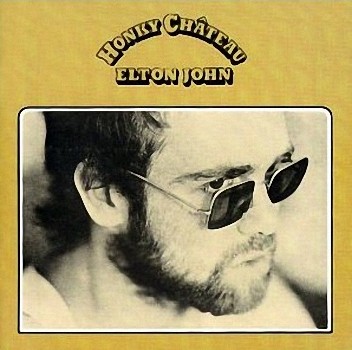Year: 19 May 1972 (CD 1993)
Label: Mobile Fidelity Sound Lab (US), UDCD 536
Style: Rock, Pop, Piano RockCountry: Pinner, Middlesex, England (25 March 1947)
Time: 45:19
Format: Flac Tracks 16/44,1 kHz
Size: 275 Mb
Наверно, если бы Элтон Джон продолжал в духе альбомов Madman Across The Water и Tumbleweed Connection, он вошел бы в историю, как серьезный исполнитель, эдакий сингер/сонграйтер на фоно (кстати, в точно таком же амплуа начинал сольную карьеру Билли Джоэл). И он никогда бы не продал миллионы дисков и не прославился своими разноцветными очками.
Это, как мне кажется, - переходный альбом Элтона. Еще очень американский по стилю, но уже значительно более легкомысленный. Может быть, по контрасту с более ранними записями, здешние американизмы - бодрые госпеллы, соулы, фанки и хонки-тонки Honky Cat, Susie, Salvation и Amy представляются слишком уж легковесными и потому - пустыми и безликими, им не хватает элтоновской индивидуальности. Зато более спокойные вещи Mellow, Rocket Man и Mona Lisas более узнаваемы и действительно вызывают эмоциональный резонанс. Этот диск относят к лучшим альбомам Элтона Джона, но у меня он не вызвает такого восторга. Легкая, ироничная Think I'm Gonna Kill Myself и лирическая Rocket Man - это уже знакомый всем Элтон Джон - яркий (во всех смыслах) поп-исполнитель.
(the-slider04.livejournal.com/391406.html?ysclid=lumiz8f2o1776184149) Review by the_slider04. 10 апреля 2009, 15:29
Elton John's Honky Chateau is a rich, warm, satisfying album that stands head and shoulders above the morass of current releases and has now succeeded in toppling the Stones from the top spot on the charts in only three weeks. Musically more varied, emotionally less contrived, lyrically more lucid than Tumbleweed Connection, Chateau rivals Elton John as his best work to date and evidences growth at every possible level.
The core of Tumbleweed was lyricist Bernie Taupin’s confused evocation of the American past, especially the Civil War epoch. On Chateau, his interest in myth has been transformed into an obsession with fantasy. John continues to assume a wide range of separate personalities who act out their personal trials against suggestive social backgrounds — most notably on "Slave," in which he sings of having been liberated and his need to now liberate his brothers and sisters, or on "Rocket Man," where he plays the part of an astronaut literally lost in space — a lyric that will have a mighty impact on any real astronauts who hear it.
But in "I Think I’m Gonna Kill Myself," "Amy," and "Hercules," he sings as people no less imaginary but much closer to home: each song concerns a teenage obsession with an unreachable woman and an unfulfillable relationship.
The remainder of the album falls somewhere between these two lyrical extremes while the music provides the ultimate definition and shading that distinguishes the different feelings and moods of each cut. Thus, "Honky Chateau" a song about the evils of the city that uses New Orleans as a symbol of the irresistible urban lure, is played out against some New Orleans-styled horn work. "Mellow," about finding and keeping the right woman, is done soulfully. "Salvation," another John-Taupin inspirational number along the lines of "Border Song," is performed with gospel overtones and "I Think I’m Gonna Kill Myself" is ironic, with a rollicking music hall ambience.
If there is a flaw in the music it is in the way John interacts with the band. He usually sings at the top of his range without much dynamic variation; in the process he forces the group and arrangements to supply most of the color. The result is that the music breaks up and the effect becomes a little too ragged.
On the other hand, no Elton John album has ever sounded looser; the bogus over-production that marred both of the earlier releases at crucial moments is never in evidence, and the album sounds more intimate and personal than either of its predecessors. John and associates are obvious creatures of the studio and so shy away from nothing in terms of technique — there is plenty of vocal double tracking, but their use of it is more natural than ever before.
"Mona Lisas and Mad Hatters" shows how much John can really do in the space of a single cut. Using minimal instrumentation and singing one of Taupin’s most direct lyrics, John effortlessly reveals the myth beneath the myth of "… a rose in Spanish Harlem." He expresses his involvement with the city, his need for its people, and his final desire to be alone through one of his best tunes, simplest arrangements, and most natural vocal performances.
Honky Chateau is ultimately a solid work with enough happening to keep someone listening for weeks trying to absorb everything on it. And, as each additional layer is revealed to the listener, he is constantly reminded that this is one of the rare albums released this year worth pursuing at length, for it rewards each additional playing with increased enlightenment and enjoyment.
(rollingstone.com/music/music-album-reviews/honky-chateau-93596/) Review by Jon Landau. August 17, 1972
01. Honky Cat (05:15)
02. Mellow (05:32)
03. I Think I'm Going To Kill Myself (03:35)
04. Susie (Dramas) (03:26)
05. Rocket Man (I Think It's Going To Be A Long, Long Time) (04:44)
06. Salvation (03:58)
07. Slave (04:21)
08. Amy (04:03)
09. Mona Lisas And Mad Hatters (05:00)
10. Hercules (05:20)
При желании можно посмотреть все мои публикации на сайте. Приятного прослушивания.
Жмём и смотрим (Click to see all of my posts)!https://tinyurl.com/4z23tdtj - TurboBit
https://tinyurl.com/fwa23uad - KatFile
https://tinyurl.com/2s4farve - FikPer
https://goo.su/rvCxzE - FreeDlink
https://goo.su/tAidG6 - UpLoady
![Elton John - Honky Chateau [24K Gold. MFSL CD] (1972) Elton John - Honky Chateau [24K Gold. MFSL CD] (1972)](https://i.postimg.cc/FzTwkTn7/Elton-John72-Honky-Chateau-500.jpg)










0 комментариев